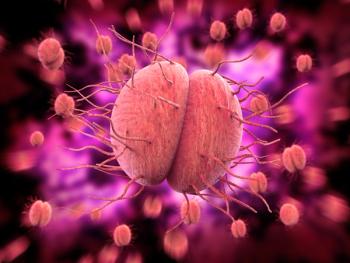
- Vol 38 No 1
- Volume 38
- Issue 01
Pandemic pediatric tips for mental health
The COVID-19 pandemic has had a severe negative toll on the mental health of many children. Here are some tips to help children achieve better psychological well-being.
Lucia had begun to take school seriously in 8th grade but now, in 9th grade, she has become disheartened and says the teachers do not explain things well virtually. She does not like to show her face on camera and has begun to stay in her room, refusing to even eat dinner with the family. She keeps asking them to leave her alone. Her parents are worried. She just wants to play video games and play music in her room, and she has stopped seeing her best friend. The freshman guidance counselor called the parents to say she has missed more than half of the school days in the last week. The parents had no idea because they both work through the day online and assumed Lucia was participating in school virtually. They don’t know what to do.
The impact of the COVID-19 pandemic has hit home, school, work, and social life unlike any other acute change in our lifetime. Resulting isolation, loss of routine, limited social contact, grief, hardship, and stress have increased difficulties and further challenged youth. The deficiencies in our health care provision of mental health care for children have been further highlighted in the press and academic journals. What can those of us on the front lines caring for children do?
Devising an approach for health care workers to address mental health concerns in brief office visits may feel overwhelming. The sections below offer practical pandemic relief to help manage mental health concerns brought by families. During office visits, you can discuss the pillars of well-being by including these 10 priorities.
1. Validation Since the pandemic hit, there have been a range of reasons for misery for everyone. Remind families that it is understandable that stress levels are high, and worrying is rampant. Parents and children face new stressors to navigate. Acknowledging this reality has potential benefit. Family environment, parenting practices, coping, and support influence psychological consequences on children.1
Parental mental health significantly impacts children, so remind parents that their own self care is important for their own and their children’s well-being. Help parents acknowledge how much their children are missing from their usual lives. School no longer includes the favorites of lunchtime chatting and playful recess interaction. Children are not likely having much opportunity online to solidify new friendships or flirt with a new crush. Their favorite activities are likely limited or on pause. Encourage parents to set aside time to devote their full focus on their children. Emotional support from parents can be protective.2
Speak privately to your patients themselves to hear concerns, validate their struggles, and share guidance for those whose home life is affected by substance use or other dysfunction. For the teenagers, their peers become top priority, yet their current environment is blanketed by a large dose of family. Family members that do not support a patient’s LGBTQIA identity, or hold opposing cultural beliefs or sociopolitical values may create tension in the home. Find out if your patients are facing rejection at home and ensure they are coping with that difficulty. Consequential stress from these conflicts and/or the presence of domestic physical, verbal, and/or emotional abuse may have a lasting impact that could be mitigated if identified.
Teach families the myriad ways the pandemic is increasing stress for many by reviewing how stress occurs in the following conditions:3
- When a circumstance is NEW.
- When an event is UNPREDICTABLE as to when or how it may occur.
- When competence is being THREATENED (challenged/threatened).
- When lack of control forces SURRENDER of your autonomy.4
Despite current times meeting all of the above criteria, there is reason for optimism. A study among 381 undergraduate students (age range: 17–24, mean: 20.16, SD = 1.46 years) suggested that active coping strategies predicted life satisfaction during the 2003 Beijing SARS epidemic, whereas the number of stressors and use of avoidant coping strategies predicted psychological symptoms.5
Present this pandemic crisis as an opportunity to learn and support well-being.
2. Routine Because unpredictability contributes to stress, a schedule does much to regulate our daily lives and contribute to a sense of stability.
Recommend families maintain consistent routines for wake up, bathing, meals, exercise, designated screen time, unwind time, and sleep. Suggest schedules be discussed collaboratively with children emphasizing what is healthy and within reason. Instead of hours, speak in minutes6 about their available time after school of 180-360 minutes depending on grade and homework prior to bedtime. The reason? To children, 120 minutes of screen time sounds like a lot compared to 20 minutes for sitting with family for meals.
3. Sleep Emphasize what you already know about the importance of sleep’s effect on physical health, appetite, mood, and coping ability. This may be the simplest but most powerful intervention you can suggest, as so many parents do not realize how significantly inadequate sleep affects a child’s functioning. Advise families on good sleep hygiene.7
4. Screen Time Watching or scrolling through the media makes us even more anxious. An excess of news and visual images about a traumatic event can create symptoms of posttraumatic stress disorder and negative health effects that remain years later, according to research by University of California at Irvine’s Roxy Silver, PhD, and others.8 Turn off the background news. Monitor Internet safety. Encourage families to view the Netflix documentary, “The Social Dilemma,” because it provides a convincing argument to limit internet use.
5. Movement Sedentary scores have shot up during the pandemic. Our brains are programmed to move and when we don’t it’s not good for our mind or body. Children in school are recommended to get 60 minutes of exercise daily. Encourage parents to keep their children active. Websites online offer creative indoor options such as “indoor and at home exercises for kids” at
6. Pursue mastery/achievement Suggest families identify a new skill/hobby/or activity to learn or do together. Learn sign language, paint a room, create questions to share with family at meals, create homemade gift surprises, play board games, learn to cook, teach the pets new tricks, make posters of passionate beliefs for windows, listen to audiobooks together, or start sharing a daily high and low.
7. Acts of kindness Research supports the link between altruistic behavior and increased health and well-being.9 Do something that makes someone’s day better. A surprise sticky note, help with cleaning up dinner, call a relative who is alone during the pandemic, bake cookies for neighbors, write a letter to a favorite teacher, volunteer online.
8. Mindfulness Anyone interested can learn this skill with simple, brief, regular practice. Help your patients understand that their goal is not to empty their minds of thought but to become aware of their sensations, emotions, and thoughts so they can use that self-awareness for their own benefit. There is evidence supporting benefits on mood, cognition, and symptoms including pain and associated with depression and anxiety.10 There are many options for learning, and countless easy and practical ways to incorporate mindfulness into a daily routine.
9. Socialize Social isolation and loneliness can contribute to worsening of mental health.11 It’s a human need. Urge families to prioritize social meet ups while keeping safety in mind. Meeting outdoors wearing masks and socially distancing can still allow kids to see each other at a park, for a walk, in the yard, on a deck or porch. Even a prearranged consistent Zoom connection for your child and a friend has value. A limited group of contacts by designating a pod within which to socialize could be considered. Reiterate Centers for Disease Control and Prevention guidelines, handwashing, and testing options to maintain safe activities.
10. Find joy Encourage parents to initiate the daily practice of noticing 3 positive moments of the day and share them with family. Create opportunities to enjoy time together. Noticing and appreciating daily pleasures can help improve mood.12
Conclusion
In every mental health diagnosis that by definition is causing impairment and/or significant suffering, whether mild, moderate, or severe, evidence supports inclusion of psychotherapy in the treatment plan. Especially in pediatrics, this may include parental guidance and intervention. When conditions are severe, a combination of psychotherapy and medications provides the best outcome across conditions. For anxiety and depression-related conditions that cause moderate impairment, consider adding Selective Serotonin Reuptake Inhibitors medication if needed to help them engage in therapy, if they have persistent issues despite evidence-based therapy, or they are unable or refuse currently to access therapy.
Finally: As caregivers, our role is to both support well-being and address common reactions during these historic threats. Additionally, we must remain vigilant and prepared to initiate treatment when challenges have progressed into significant impairment and suffering.
RESOURCE LINKS
Coronavirus resources
Coping advice and helpful links for range of potential challenges:
American Academy of Child and Adolescent Psychiatry Link
Broad list and links of resources for both Families and Clinicians
Clinician resources for mental health management in primary care:
The REACH Institute
Guidelines for Adolescent Depression in Primary Care (GLAD-PC).
This comprehensive and practical resource includes practice guidance for administrative steps and billing as well as clinician tools such as diagnostic guidelines, rating scales, and pt/family handouts.
AAP Primary Care Tools for Mental Health
A Guide to Psychopharmacology for Pediatricians
Hotlines
- Text crisis line: 741741 (only 6 digits); text STEVE for POC counselor
- Suicide Hotline: 1-800-273-TALK(8255)
- Trans Lifeline Peer Support US:1-877-565-8860
- TrevorLifeline(LGBTQIA support) 1-866-488-7386
- RAINN Sexual Assault Hotline: 1-800-656-4673
- National Helpline for Substance Use 1-844-289-0879
- QUEER/LGBTQ+ SUPPORT AND RESOURCES:
www.thetrevorproject.org - Substance Abuse and Mental Health Services Administration National Helpline 1-800-662-HELP, or TTY 1-800-487-4889
Family resources and information
- National Alliance on Mental Illness:
www.nami.org - American Academy of Child and Adolescent Psychiatry:
www.aacap.org
References
1. Cobham V.E., McDermott B., Haslam D., Sanders M.R. The Role of Parents, Parenting and the Family Environment in Children's Post-Disaster Mental Health. In Current Psychiatry Reports. 2016;18(6) doi: 10.1007/s11920-016-0691-4
2. Gudmundsdóttir D.G., Ásgeirsdóttir B.B., Huppert F.A., Sigfúsdóttir I.D., Valdimarsdóttir U.A., Hauksdóttir A. How Does the Economic Crisis Influence Adolescents’ Happiness? Population-Based Surveys in Iceland in 2000–2010. Journal of Happiness Studies. 2016;17(3):1219–1234. doi: 10.1007/s10902-015-9639-3
3. Stress. Mental Health Foundation.
4. Recipe for stress. CESH / CSHS.
5. Guessoum SB, Lachal J, Radjack R, et al. Adolescent psychiatric disorders during the COVID-19 pandemic and lockdown. Psychiatry research.
6. As suggested by Grizelda Anguiano, MD, FAAP on REACh PPP call.
7. Healthy Sleep Habits: How Many Hours Does Your Child Need? HealthyChildren.org.
8. Roxane Cohen Silver EAH. Mental- and Physical-Health Effects of Acute Exposure to Media Images of the September 11, 2001, Attacks and the Iraq War - Roxane Cohen Silver, E. Alison Holman, Judith Pizarro Andersen, Michael Poulin, Daniel N. McIntosh, Virginia Gil-Rivas, 2013. SAGE Journals.
9. Irani A. Positive Altruism: Helping that Benefits Both the Recipient and Giver. ScholarlyCommons.
10. Simkin DR, Black NB. Meditation and mindfulness in clinical practice. Child Adolesc Psychiatr Clin N Am. 2014;23(3):487-534. doi:10.1016/j.chc.2014.03.002
11. N. Leigh-Hunt, D. Bagguley, K. Bash, V. Turner, S. Turnbull, N. Valtorta, W. Caan. An overview of systematic reviews on the public health consequences of social isolation and loneliness, Public Health,2017:152: 157-171/ ISSN 0033-3506.
12. The Neuroscience of Gratitude and How It Affects Anxiety & Grief. PositivePsychology.com.
Articles in this issue
almost 5 years ago
New Year’s greetings!almost 5 years ago
State of the union on COVID-19almost 5 years ago
Red papulonodule with central crusting on a neonate’s cheekalmost 5 years ago
It’s winter: Are children getting enough Vitamin D?almost 5 years ago
A pediatrician’s role in dyslexia: Where theory meets practicealmost 5 years ago
A case of terra firma—forme dermatosisalmost 5 years ago
Dangers of the TikTok Benadryl challengealmost 5 years ago
Plagiocephaly may be an early indicator of developmental delay riskalmost 5 years ago
How well can a brief step test assess exercise tolerance?Newsletter
Access practical, evidence-based guidance to support better care for our youngest patients. Join our email list for the latest clinical updates.









